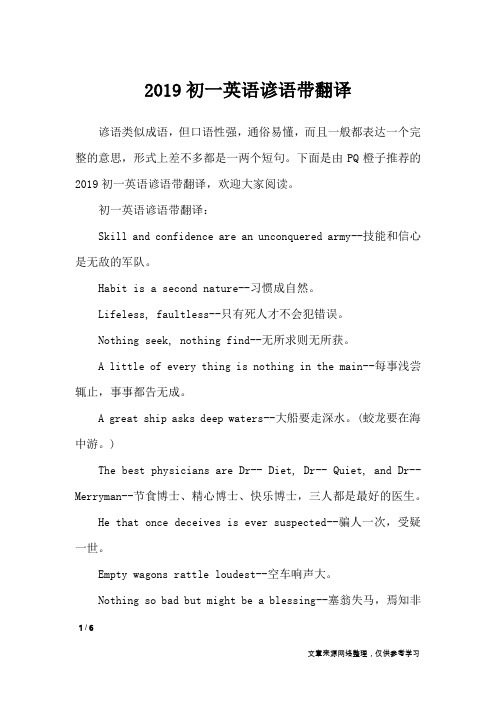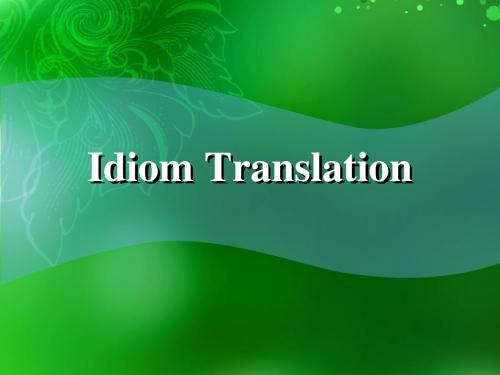Interpreting Idioms谚语翻译
- 格式:doc
- 大小:100.50 KB
- 文档页数:21

50句经典英语谚语带翻译英语谚语指流传于英国和美国的比较简练而且言简意赅的话语。
你们知道有哪些经典英语谚语呢?接下来就请跟随店铺一起来学习一下吧。
50句经典英语谚语带翻译如下1.There is no rose without a thorn.没有不带刺的玫瑰。
世上没有十全的幸福。
2.An old dog will learn no new tricks.老狗学不出新把戏。
老顽固不能学新事物。
3.A good dog deserves a good bone.好狗应该得好骨头。
有功者受奖。
4.the children from well-fed family.膏粱子弟5.pour water off a steep roof(operate from a strategically advantageous position)高屋建筑6.Bad workmen often blame their tools.拙匠常怪工具差。
(不会撑船怪河弯)。
7.He who laughs at crooked men should need walk very straight.己不正不正人(笑别人驼背的人得自己首先把身子挺直)you should not cast the first stone.欲责他人,先思己过8.It's a long lane that has no turning.路必有弯。
(事必有变)。
(瓦片也有翻身日)。
9.Onw swallow does not make a summer.一燕不成夏。
10.No smoke without fire.无火不起烟。
(无风不起浪)。
11.Ill news comes apace.好事不出门,坏事传千里。
12.He sho keeps company with the wolf will learn to howl. 近朱者赤,近墨者黑。

英语谚语大全带翻译100句大全英语谚语源自文化典籍的“雅谚”,有些是在民间口语说法的基础上提炼打磨而成,以下是小编精心收集整理的英语谚语,下面小编就和大家分享,来欣赏一下吧。
英语谚语篇11、眼见为实,耳听为虚。
seeing is true, hearing is false.2、种瓜得瓜,种豆得豆。
you get what you grow, you get what you grow.3、良言一句三冬暖,恶语伤人六月寒。
good words are warm in winter, bad words hurt in june.4、春旱不算旱,秋旱减一半。
spring drought is not drought, autumn drought is reduced by half.5、财主顿顿吃得香,农民天天泪汪汪。
the wealthy eats delicious meals, and the peasants weep every day.6、贪婪之人切莫上山,馋嘴之人切莫留家。
greedy people must not go up the mountain, greedy people must not stay at home.7、见人说人话,见鬼说鬼话。
see people talk and ghosts talk.8、靠山吃山,靠水吃水。
eat mountains by mountains and water by water.9、南风多雾露,北风多寒霜。
the south wind is foggy and the north wind is frosty.10、急雷雨易停,闷雷天难开。
it's easy to stop thunderstorms, but it's hard to open a dull thunderstorm.11、沟泥、河泥、水杂草,都是省钱好料。

2019初一英语谚语带翻译谚语类似成语,但口语性强,通俗易懂,而且一般都表达一个完整的意思,形式上差不多都是一两个短句。
下面是由PQ橙子推荐的2019初一英语谚语带翻译,欢迎大家阅读。
初一英语谚语带翻译:Skill and confidence are an unconquered army--技能和信心是无敌的军队。
Habit is a second nature--习惯成自然。
Lifeless, faultless--只有死人才不会犯错误。
Nothing seek, nothing find--无所求则无所获。
A little of every thing is nothing in the main--每事浅尝辄止,事事都告无成。
A great ship asks deep waters--大船要走深水。
(蛟龙要在海中游。
)The best physicians are Dr-- Diet, Dr-- Quiet, and Dr-- Merryman--节食博士、精心博士、快乐博士,三人都是最好的医生。
He that once deceives is ever suspected--骗人一次,受疑一世。
Empty wagons rattle loudest--空车响声大。
Nothing so bad but might be a blessing--塞翁失马,焉知非1 / 6福。
A book is the same today as it always was and it will never change--好书千载常如新。
Books, like friends, should be few and well chosen--读书如择友,宜少且宜精。
Look before you leap-- First think, then act--三思而后行。
It is never too late to mend--亡羊补牢,犹为未晚。



经典英文谚语及中文翻译经典英文谚语及中文翻译谚语是一个汉语词语,读音yàn yǔ,谚语是汉语的重要组成部分,是指广泛流传于民间的言简意赅的短语。
多数谚语反映了劳动人民的`生活实践经验,而且一般是经过口头传下来的。
它多是口语形式的通俗易懂的短句或韵语。
下面为大家带来了经典英文谚语及中文翻译,欢迎大家参考!经典英文谚语及中文翻译1To put the cart before the horse.本末倒置。
To help a lame dog over a stile.雪中送炭。
Time tries all things. 时间检验一切。
Time heals all wounds. 时间能够治疗一切创伤。
Time flies! 光阴似箭。
Time and tide wait for no man. 岁月不等人。
there is time for everything. 凡事皆有时。
Take time when time cometh,lest time steal away.时来必须要趁时,不然时去无声息。
Strike while the iron is hot.趁热打铁。
Punctuality is the soul of business守时为立业之要素。
Procrastination is the thief of time.因循拖延是时间的大敌;拖延就是浪费时间。
No garden without its weeds.没有不长草的园子。
No cross, no crown.不经历风雨,怎么见彩虹。
New wine in old bottles.旧瓶装新酒。
Never too old to learn, never too late to turn.亡羊补牢,为时未晚。
Never say die.永不言败。
Never put off till tomorrow what may be done today.今日事,今日毕。
英语俗语100句及翻译英语谚语也是民众丰富智慧和普遍经验的规律性总结。
以下是小编精心收集整理的英语谚语,下面小编就和大家分享,来欣赏一下吧。
英语谚语篇11、锻炼不刻苦,纸上画老虎。
Exercise is not hard. Draw tigers on paper.2、广交不如择友,投师不如访友。
It's better to choose friends than to make friends.3、当断不断,反受其乱。
Be judgmental and confused.4、不吸烟,不喝酒,病魔见了绕道走。
No smoking, no drinking, the disease saw a detour.5、狗朝屁走,人朝势走。
Dogs go fart, people go at the trend.6、正月二十五刮南风,春天多雨。
The south wind blows on the twenty-fifth day of the first month, and it rains in spring.7、狗急跳墙,人急悬梁。
Dogs jump on the wall and people jump on the beam.8、内行看门道,外行看热闹。
The expert watches the doorway, the layman watches the lively.9、吃饭防噎,走路防跌。
Eat to prevent choking, walk to prevent falling.10、有志不在年高,无志空长百岁。
The ambition is not to be old, but to be a hundred years old.11、船头坐得稳,不怕风来颠。
The bow of the boat is stable and not afraid of the wind.12、人怕劝,车怕垫。
Interpreting IdiomsBoth English and Chinese are particularly rich in idioms. Idioms are so vivid, terse, colloquial, and forcible in conveying a particular meaning that they are frequently used by speakers of both languages. Chinese and English idioms came into being under different historical, geographical, cultural and social backgrounds, so they contain different stories reflecting different environment, life, history, culture and values of the native speakers. It is surely no easy thing to understand idioms, let alone interpret them off-handed. One can hardly expect to provide a satisfactory rendition of an idiom unless he is guided by the correct method and, at the same time, manages to get an accurate understanding of its implied meaning through its surface structure according to the context.1.Definition of IdiomsIdioms can be understood both in a broad sense an din a narrow one. In the narrow sense, they simply refer to the set phrases or clauses used in a language. Broadly speaking, they comprise all the idiomatic and special expressions in that language, including, in this context, all the set phrases, colloquialisms, proverbs, slang and clichés in English, and all the four-character set phrases(成语), common sayings(俗语), proverbs and two-part allegorical sayings(歇后语) (of which the first part is descriptive and the second part carries the message)in Chinese. It is their broad sense that we are discussing in this unit. Hence, an idiom can be defined as a group of words with meaning different from the combined meanings of its component words. It is a combination of two or more words which are usually structurally fixed and semantically hard to understand, and function as a single unit of meaning. For example, “red tape”is an English idiom which means “official rules and procedures that seem unnecessary and cause delay.”But one can hardly guess its meaning from the individual words that form it, for these words have already lost their original meaning.An idiomatic expression is an established form that has been accepted by traditional usage. The words in it cannot, as a rule, be depleted or replaced by synonymous words, or put in a different order, without affecting or destroying the meaning. Therefore, the component words, the word order and the meaning of each idiom must be remembered as a whole.2.Methods of Interpreting Idioms2.1.Borrowing(借用法) or Idiom for Idiom (以习语译习语)As we mentioned previously, both Chinese and English abound in idioms. Some idioms in one language contain images, descriptions and meanings identical to idioms in the other language. This is because certain natural and human experiences are shared by the whole mankind wherever they live. There are also idioms that express the same meanings though they don’t have identical metaphors or images. In both cases, we might as well borrow them directly from the target language so as to retain their vividness and achieve equivalence in effect. For example:一箭双雕(一举两得)混水摸鱼fish in troubled water三思而后行Look before you leap.有志者,事竟成。
无风不起浪。
There is no smoke without fire.饥不择食Hungry dogs will eat dirty puddings.一朝被蛇咬,十年怕井绳。
A burnt child dreads fire. / Once bitten, twice shy.滴水穿石Constant dripping wears the stone.破釜沉舟to burn one’s boat隔墙有耳Walls have ears.积少成多Many a little makes a mickle.一言既出,驷马难追What is said cannot be unsaid.谋事在人,成事在天。
Man proposes, god disposes.既往不咎Let bygones be bygones.有钱能使鬼推磨。
Money makes mare go; money talks.一寸光阴一寸金。
The spirit is willing but the flesh is weak.Birds of a feather flock together.Two heads are better than one.Give him an inch and he will take an ell.Justice has long arms.Once bitten, twice shy.Better be the head of a dog than the tail of a lion.to kill the goose that lays golden eggsStrike while the iron is hot.to fish in the airDon’t wash your dirty linen in public.All good things must come to an end.A fall into the pit, a gain in your wit.2.2 直译(literal translation)。
Literal translation means word-for-word rendition, bringing the whole image into the target language. This approach is used when the image contained in an idiom can be easily understood by the speakersof the target language.(但是要特别注意译出来必须是不会产生歧义的,否则会适得其反,就不如意译了。
) For example:良药苦口利于病,忠言逆耳利于行。
Good medicine is bitter in the mouth, but good for the disease; good-intended words offend the ear, but good for the conduct.远水救不了近火。
Distant water cannot put out nearby fire.易如反掌鼠目寸光see no farther than one’s nose君子动口不动手武装到牙齿引狼入室head wolf to the house以牙还牙千里之行,始于足下 A thousand-li journey is started by taking the first step.削足适履to cut the feet to fit the shoes血浓于水Blood is thicker than water.玩火play with fire摊牌to show one’s cards2.3 意译(释义)(Paraphrasing or free translation)Some idioms which exhibit strong national or cultural characteristics can neither be handled by borrowing idioms from the target language nor translated literally because it would cause misunderstanding or could not be easily accepted by native speakers of the other language. In this case, it is necessary to resort to paraphrasing according to the context. For example:鹬蚌相争,渔翁得利。